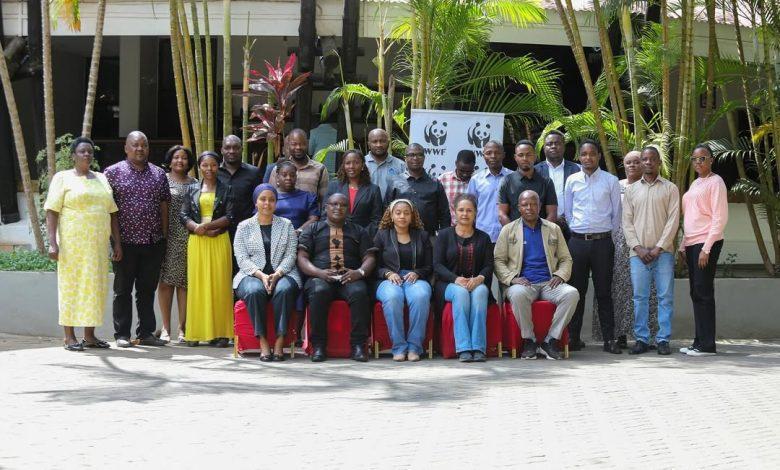Africa-Press – Tanzania. “ ALONE we can do so little, but together we can do so much.”
These powerful words were spoken by Ms Helen Keller, the American author, lecturer and activist who became a global symbol of courage and determination.
Her message echoed vividly in Morogoro earlier this week, where collaboration proved to be the heartbeat of success.
What began as an idea grew into a landmark seminar, an event that brought together conservationists, bankers and journalists under one roof, united by a single mission -advancing sustainable development for Tanzania’s future.
The seminar, jointly organised by World Wildlife Fund (WWF), Tanzania Bankers Association (TBA) and the Journalists Environmental Association of Tanzania (JET), was more than a meeting of minds. It was a powerful workshop of how institutions from different sectors can come together and combining their strengths to create meaningful impact.
Inside a hotel in Morogoro, the energy was palpable. Conservation experts laid out the urgent need for bankable naturebased solutions and financial leaders explored how investments can align with sustainability while journalists prepared to amplify the message to millions of people beyond the conference room walls.
Each voice, distinct in its perspective and merged into a common narrative also and that safeguarding the environment is not a responsibility for one group alone, but a shared duty that thrives on cooperation.
By weaving together WWF’s conservation expertise, TBA’s financial leadership and JET’s Media influence, the seminar became a powerful step forward, turning ideas into strategies and strategies into action. It was, in every sense, a story of partnership proving stronger than individual effort.
In a special interview with Ms Happiness Minja, the Senior Programme Officer at WWF Tanzania, elaborated that the power of education, awareness and collaboration in driving sustainable change bringing impact can and only be achieved when knowledge is shared widely and when diverse sectors come together with a unified purpose.
“First and foremost, we have shared knowledge on sustainable environments and infrastructure. We have worked to educate stakeholders as well as the wider public about the importance of sustainable environmental investments, especially through our ongoing partnership with the Tanzania Bankers’ Association (TBA),” she said.
She pointed out: “The workshop also provided a rare opportunity to bridge the gap between conservation and finance – two fields often seen as worlds apart. The participating journalists gained deeper insight into how financial systems and conservation are closely interconnected.”
“Finance plays a very big role It is not just about money and it is about directing resources in a way that supports both environmental sustainability and social growth. This understanding will help to drive long-term development for communities.
“The seminar touched on broader frameworks such as Environmental, Social and Governance (ESG) principles and WWF’s 2030 Road Map.
These global guidelines are intended to raise the standards of environmental protection in Tanzania and ensure that conservation is treated as a national priority.
“The common theme throughout has been sustainability whether we are talking about finance, policy, or community action. Sustainable finance, in particular, remains at the heart of everything we are doing.
“The importance of aligning WWF’s efforts with government policies and ministries. Discussions during the seminar also looked at how WWF can strengthen partnerships with the Tanzanian government in areas such as forestry management, climate change adaptation and natural resource governance,” she recalled and remarked.
“We also shared brief insights into how WWF intends to work hand in hand with government institutions and ministries. From forest conservation to addressing climate change, these collaborations will be key in ensuring that our environment is safeguarded for future generations,” Ms Minja pointed out.
To her part, Ms Sophia Mmbuji, the Research and Communication Officer at the TBA, underscored the vital role of the financial sector in shaping sustainable futures. Through the seminar narrating that, TBA has been able to not only share knowledge but also highlight the responsibility banks carry in environmental conservation.
“One of TBA’s main goals was to raise awareness among its member banks, ensuring that financial decision-making is aligned with sustainability principles. The banks are not just service providers; they are powerful actors with the capacity to influence long-term development through sustainable finance.
“Our members who are banks must understand that their role goes beyond profit. By integrating environmental considerations into their policies and investments, they contribute directly to the preservation of our environment.
“Awareness is at the heart of this mission. By engaging both banking institutions and the wider community, TBA hopes to cultivate a deeper appreciation of how financial systems can work hand in hand with conservation efforts.
“The involvement of the Tanzania Bankers Association is especially significant because banks sit at the centre of national development. Financial institutions determine where resources flow, which projects are funded and what kind of growth is prioritised. By choosing to integrate sustainability into their operations, banks can directly influence the country’s trajectory toward a greener and more responsible economy.
“This means that when TBA trains its members on environmental conservation and sustainable finance, the effects ripple far beyond the banking sector. Loans and investments can be redirected toward renewable energy, eco-friendly infrastructure and businesses that adopt responsible environmental practices.
“In doing so, banks not only protect the environment but also reduce risks associated with climate change and ensure long-term financial stability,” Miss Mmbjui narrated with emphasis in explanations.
For More News And Analysis About Tanzania Follow Africa-Press







